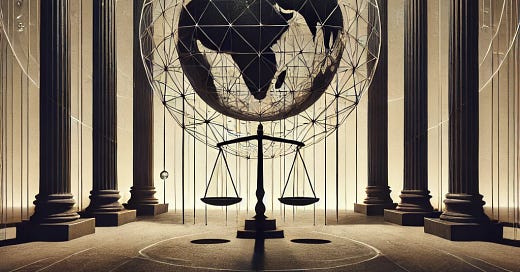I’m not a futurist, I’m a presentist. Strategy is about getting from point A to point B, any most people skip the part where they actually try to understand point A. So, I’m not interested in predictions about tomorrow, as much as I am in right the hell now. And this is a very interesting moment in time, even as someone who thinks everything is interesting. Here are some things I’m thinking about as we start a new year.
Political Inversion.
Most stable western democracies are entering a massive anti-incumbent stage, at a particularly polarized time in politics. It’s partially the collapse of the post-WW2 global order, partially chaos in the Middle East, partially war in Europe, and partially the COVID hangover, but things are hard right now, and we tend to make the assumption that changing governments means changing our circumstances. Maybe I’m wrong and electing a broad range of conservative leaders will make a hard situation better. But I’m not seeing clear policies that will actually improve anything, beyond throwing a bone to a subset of grievances, and lowering taxes by offloading costs onto the individual.
The west has shifted to an economy that almost requires an education that we have decided to make less universal and accessible, and more a matter of money and prestige. So we have what feels like a less well educated population, with worse career outcomes. This is the cause of a lack of political literacy, conspiracy theories, distrust in medical advice, and a million other problems. We are currently creating the next generation’s backlash against the elites, because we are starving public schools and higher education alike of public funding, and making curriculum decisions based on political expediency. I’m bringing this up because this is a 20 year problem to solve, and it’s somehow not a major political issue every single day. We’re going to ignore this in 2025, and our class divide is going to get worse as people with means homeschool, private school, tutor and special program their kids through a system that is failing, and worse, not even being given a chance to succeed.
Canada (where I live) is undergoing a crisis of identity - where does a nation defined by multiculturalism go when it’s dealing with a rising tide of intolerance (with the most obvious examples focused at Indian immigrants, and the Jewish community)? The current answer is “deeper into intolerance” as we have higher levels of anti-immigration sentiment than I can find in the post-WW2 record. We’re blaming our economic and housing problems on immigrants which, in general, is the dumbest trope of politics. Expect to read “it can happen here” many times this year during our ongoing identity crisis.
Shifting Sources of Trust.
The social media and digital companies that have been taking over advertising for 25 years have successfully completed regulatory capture, by effectively purchasing a president. With fear of monopoly charges dialled way back, expect more direct competition from platforms that have been telling your clients they know better for a decade anyway. At the very least media-only agencies are under threat. You think X is making enough money to avoid trying to eat your lunch?
The debate about the impact social media has on teens, privacy concerns, foreign interference concerns, and a general stress on the subject is going to make marketing harder. Especially as core platforms for influencer and creator marketing remain under threat.
Speaking of, I’m calling this year as the breaking point for trust in institutions. As such, individuals are the new beneficiaries of that trust. Influencer marketing is only going to get more important, and the boundaries that separate it from celebrity endorsement or creator partnerships are getting less important.
Do you (or your clients) have a person or a face that can facilitate para-social relationships with customers to build loyalty and trust? And is that person willing to sacrifice their identity and autonomy to create and maintain an audience relationship? Because our growing reliance on influencer personalities seems directly correlated with increasing transparency on the reality of creator burnout, and how non-transferable that kind of fame is. It seems like every week I see another clip of a mega influencer breaking down about the pressure they are under, or another failed transition to acting / music / athleisure brand ownership.
Economic Fallout.
During the pandemic I had many, many conversations with clients about the “k-shaped” recovery - the idea that for people with economic security, COVID was actually a springboard (forced savings and a booming stock market), but for those lacking economic security it was a potentially permanent blow. What I didn’t consider was how many people were going to shift between those paths when the artificial, government supported stability of 2020-2022 turned into mass layoffs, inflation, and general bad vibes. I also didn’t consider how many people were hiding their lockdown trauma and deteriorating relationships behind that same economic security. 2025 is going to include a lot of that aftermath - the bill came due in 2024, and this year tactics are shifting from polite reminders to unavoidable consequences.
Tech shifting toward efficiency, advertising seeing the biggest merger in its history, and (already) a battle within the American right on whether capitalism or nativism is the core principle of the next era? All of these things are rooted in a general sense that a reckoning is either coming or has already arrived, and that we need to get our ducks in a row before it’s too late.
The view from today sounds kind of depressing, when I write it out. And I didn’t jump into writing this with a negative attitude. But 2024 was very hard for a lot of people, and the broader culture didn’t exactly portray that honestly. What I will say, is that many of the very best moments of humanity come from acknowledging the hardship someone else is facing, and offering them some kindness or grace in that moment. This is an almost universal behaviour, assuming you see whoever is struggling as a person like yourself.
I had a pretty great 2024, actually. Very little of that was down to anything I did during the year, other than start a new job. Most of it was positive returns of time and effort invested in years prior. The only advice I’d offer about the future is that most of us plan on too short a timeline. Figure out who you want to be in a decade, and work backward from there. Make choices that get you closer to future you want.





